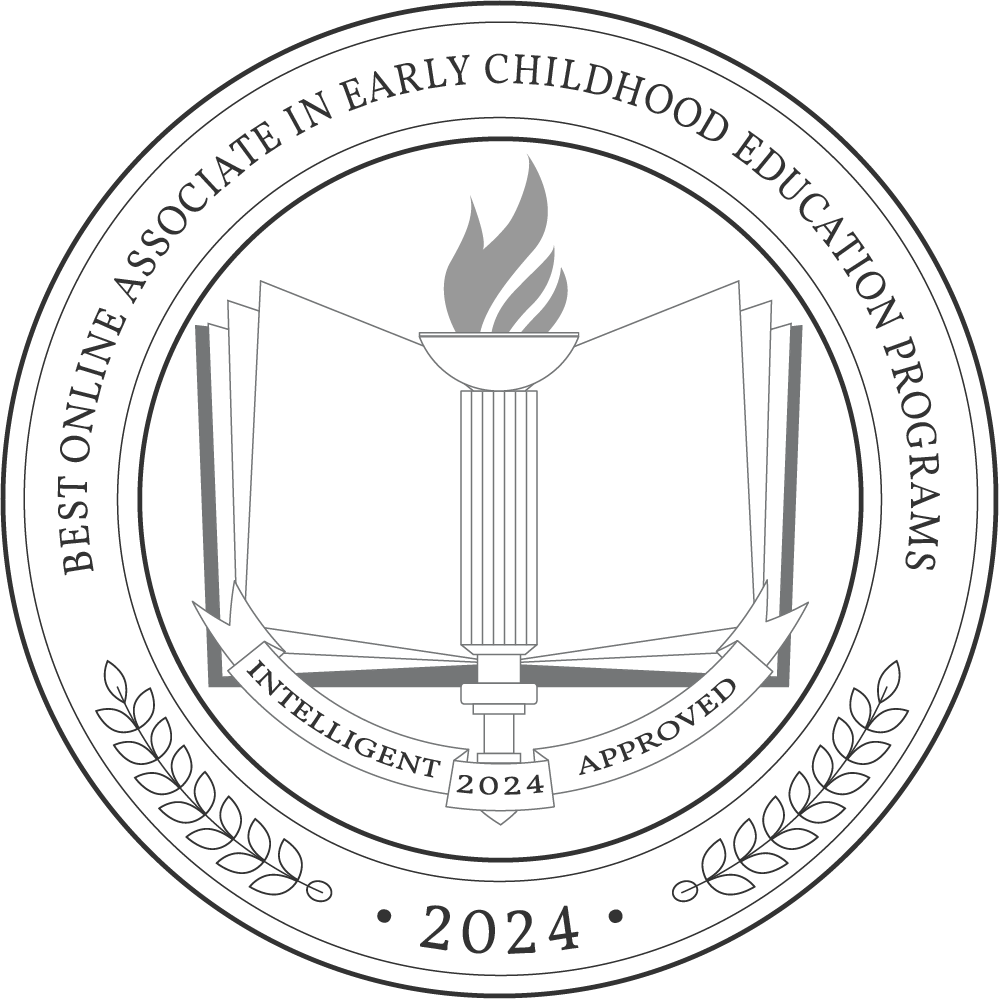Why This Matters
-
AN ASSOCIATE DEGREE WILL QUALIFY YOU FOR 41% OF PRESCHOOL TEACHER JOBS
According to O*NET, 12% of preschool teacher jobs require applicants to have at least a postsecondary nondegree award, while 29% only require a high school diploma.
-
17,200 NEW JOBS FOR PRESCHOOL TEACHERS
The demand for early childhood educators is expected to grow 3% from 2022 to 2032, resulting in over 17,000 new jobs.
-
EARN $35,330 AS AN EARLY CHILDHOOD EDUCATOR
Preschool teachers earn $35,330 per year on average. The lowest 10% make less than $23,920, while the highest 10% make more than $58,580.
Our Research
This list features some of the best online associate in early childhood education degree programs at top colleges nationwide. Each school featured is a nonprofit, accredited institution — either public or private — with a high standard of academic quality for post-secondary education. Many of the programs on our list have been accredited by the National Association for the Education of Young Children (NAEYC), which assesses the objectives, quality, and overall effectiveness of early childhood education programs.
We evaluated each school’s program on admission, retention, and graduation rates as well as tuition costs, faculty, reputation, and the resources provided for online students. Then, we calculated the Intelligent Score on a scale of 0 to 100. Read more about our ranking methodology.
Next, we compared this comprehensive list of online associate in early childhood education degree programs to a list of aggregated college rankings from reputable publications like U.S. News & World Report, among others, to simplify a student’s college search. We pored through these rankings so students don’t have to.
- 61 hours to write this article
- 200 universities and colleges we assessed
- 363 education programs we compared
The Top 50 Online Associate in Early Childhood Education Programs

Discover More Options
What You Should Know About This Degree
Early childhood education traditionally covers birth through about age 8. The key difference among early childhood educators are the ages they focus on. Preschool teachers focus on teaching basic skills such as identifying colors, numbers, letters, and shapes, while kindergarten and elementary school teachers focus more on math, reading, and writing. Elementary school teachers often also need a bachelor’s degree.
Only apply to schools approved by a DOE-recognized accrediting organization, such as the New England Commission of Higher Education (NECHE) or Northwest Commission on Colleges and Universities (NWCCU). If your school isn’t accredited, you may be unable to access financial aid or transfer credits to another institution if needed.
If you’re interested in a job in early childhood education and want to work in a public school, you will need a state teaching license or ECE certificate.
What’s Next?
Here are some questions to ask when researching online associate in early childhood education programs:
- Am I eligible for this program? Most associate degree programs require a high school diploma or equivalency. Students often must complete some general education college courses in areas like math, English, and science. You might also need to maintain a certain GPA and be able to pass a criminal and character background check.
- How long does it take to complete this online degree? Associate degree programs are typically offered at community colleges and include 60 college credit hours. Students generally complete these requirements in two years by taking 12 to 18 credit hours per semester.
Once you’ve decided on a program and the courses you’re interested in pursuing, you should contact the admissions department at the school you want to attend and find out what their process and requirements are.
Also, research your financing options. Make sure to note what scholarships, financial aid, and tuition reimbursements you might qualify for and what the deadlines are for each.
Compare School Options
Related Degrees
- K-12 Education
- Special Education
- Graduate Certificate in Elementary Education